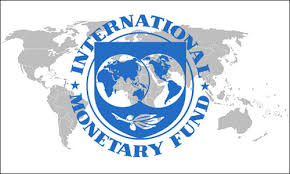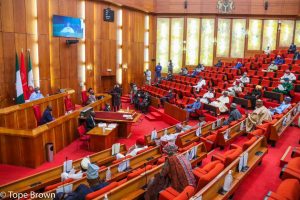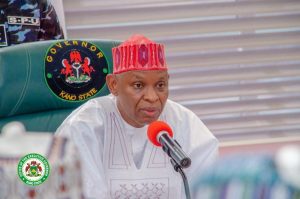Covid-19 Endemics And Nigeria Export Volume


Background:
POLICY BRIEFS
The endemic, hydra-headed disease – the coronavirus which was formally named “COVID-19” by the world health organization (W.H.O) is now fast becoming global menace and is perhaps the most chronic and fatal disease outbreak of the 21st century. Experts agreed that COVID-19 will have a larger negative effect on the global economy than the SARS outbreak in 2003. At the time of SARS, China was the sixth-largest economy, accounting for only 4.2% of the world GDP. China is now the world’s second-largest economy, accounting for 16.3% of world GDP. The epidemy which was first discovered on 31 December, 2019 in Wuhan City, Hubei Province of China has now hit a global record of over 3043 death, well over 80,174 confirmed cases around the world [1] as at the time of writing this article. The virus which has gained a presence in all the continent is classified as zoonotic and novel in the sense that is a new strain of the virus that has not been previously identified in humans [2] .Why world health organization (W.H.O) declared that the outbreak constitutes a Public Health Emergency of International Concern (PHEIC) and at the same time working relentlessly with global experts, governments and partners to swiftly expand scientific knowledge on the new virus, to contain the spread and asperity of the virus, and to provide advice to countries and individuals on measures to protect health and prevent the spread of this outbreak [3] , it, however, remains pervasive and possess serious detrimental consequences to the world’s economy. The greatest fear is the record traffic of human travels to and fro China for business, tourism and also the important position of China in the global supply chains, thus the centrality of China to global supply chains heighten the risk of the virus spreading.
Is Global Trade faring well in the face of COVID-19?
As China struggles with combating the virus, the fallout is not only affecting the Chinese economy, the world’s second-largest and main manufacturing hub, but also an import strategic partner to many. The consequence of Covid-19 to the global oil demand is significant. Of the world’s total crude oil consumption of 100.73 million barrels per day, China consumes 13.29m bbl./day, which is 14.5 per cent of the world’s consumption, making it the second-largest consumer of crude oil in world after the United State of America with average daily consumption of 18.5m bbl./day, accounting for 20 per cent of total world’s consumption [4] . However, since the outbreak of the coronavirus China has cut down on his crude oil demand from 13.84 m bbl./day in Q4, 2019 to 13.29 m bbl./day [5] . These statistics, without doubt, underscores the reason for the continuous decline in oil price we have witnessed since the outbreak of the epidemics in China at the beginning of the year [6] . Oil price opened the year with $64 pb and decreased consistently to $55pb by February 2020 [7] .Demand is now expected to contract by 435 kb/d in 1Q20, the first quarterly decrease in more than a decade [8] . The impact of Covid-19 for oil prices has been sharp: Brent values fell by about $10/bbl, or 20%, to below $55/bbl [9] . Moreover, the volume of world merchandise trade which went on a downward trajectory by 0.2% in the third quarter of 2019 compared to the previous year though pick up in the 4th quarter of 2019 is most expected to still contract to owe to the ripple effect of COVID-19 [10]
Africa Trade and COVID-19
Africa continent is highly interlinked to the Chinese market and this makes her more economically vulnerable. China’s economy which was already on a sluggish pace before the COVID-19 outbreak but now with several consumers been forced to stay indoors – consumer spending on imported commodities from Africa is expected to decline as more household income is expended on healthcare, this is having an immediate impact on demand for African agricultural exports like Namibian beef, Rwandan coffee, Kenyan tea and South African wine and citrus.
Will Nigeria’s export to China remain unpretentious?
Nigeria which is predominantly oil export-dependent will be mostly hit by this as China which is the 2nd largest importer of Nigeria oil has cut down on his oil demand from Nigeria due to China’s huge fund diversion to the health sector in a bid to curb the COVID-19 endemic. Nigeria’s $57 crude oil price benchmark in the 2020 budget is now been threatened as OPEC basket price falls to $50.16 [11] . The impact is already weighing down on Nigeria foreign reserve which also continues to drop consistently, currently at $36.7 billion (liquid) compared to $37 billion recorded in December 2019 (liquid) [12] . In 2018, Cocoa, Rough Wood, Leather and Ethylene polymer which top the list of the Nigeria’s export to China was valued at $12.3 Million, $217, $11.7 million and $39.8 Million respectively [13] . These, non-oil export volume to China is expected to decline further if necessary action on export diversification is not taken. Many manufacturing industries in Nigeria are run by Chinese and as of May 2019, Chinese companies had invested $20 billion [14] in over 150 firms in Nigeria. However, Before the close of 2019, many Chinese citizens returned to China for Lunar break of which many have now been held back in China since the outbreak of the disease in December 2019. Thus, resulting in the decimation of our manufacturing output. Beyond the detrimental effect to the export volume; Nigeria further stands to experience delay in the completion of series of National infrastructural project currently ongoing in different part of the country especially the rail and road construction which are been handled by Chinese firms.
A new course of Action
With the drop in crude oil price, this should further boost not just the Nigerian government intervention in the non-oil sector but also a call for African Heads of states to shift away from over reliance on the extractive industry to value addition products and services. This will also shield the Nigerian economy from oil price shock which had previously led the country into recession.
The Nigerian government should set up an inclusive export policy control board whose primary responsibility is to follow up and measure the performance and outcomes of policies emanating from the collaborative effort of the Federal government of Nigeria, State government, the Ministry of Finance and National Planning, the Ministry of Industry, Trade and Investment, the Central Bank of Nigeria, the Nigerian Export Promotion Council, the Nigerian Export and Import Bank and other stakeholders in the development of export trade in the country. Some of the outcomes to be measured are risk moderation, export credit services, investment maturity periods, lower transaction costs, export procedures and export financing on better terms for exporters.
The Nigerian private sector should employ co-integration approach that will reduce or eliminate risk and waste within the non-oil export value chain. This fate can be achieved is there is long term structured data collection system that will provide evidence along the equilibrium of investment, return on investment, trade relationship with the domestic environment, exports and other major determinants. The data collected will be use to predict and adjust variables that impact the value chain and substantial variation in the risk exposure of all actors in the export ecosystem of non-oil export.
Nigeria already has a comparative advantage in the production of agricultural produce but low and volatile prices provided disincentives to invest in agriculture, to overcome this Nigeria government at all levels should focus on agricultural value addition by creating enabling environment that will encourage private sector investment to establish agro-based manufacturing industries which will spur investment and boost production for export.
Finally, effort must be made to substantially improve power supply as this will only guarantee increase in manufacturing sector productivity. The NGN61billion provision for power under the presidential power initiative in 2020 budget should be appropriately channeled to the power sector as stipulated in the medium term expenditure framework of 2019 to 2021 [15] .
Africa International Trade & Commerce Research
DL: +234 8147429461; +2349058603907
Centre Court 1, 46 Crescent, off 4th Avenue, Gwarinpa Abuja, Nigeria
[email protected]
Tw: @Africatradelink |Fb: www.africainternationaltrade.com/africainternationaltrade |LinkedIn: Africa International Trade & Commerce Research
www.africainternationaltrade.com
[1] W.H.O. 2020. COVID-19 Situation report.
[2] NCDC 2020. 3rd February 2020| Public Health Advisory to Nigerians On Novel Coronavirus (#3). https://ncdc.gov.ng/news/222/3rd-february-2020%7C-public-health-advisory-to-nigerians-on-novel-coronavirus-%28%233%29
[3] 2020. World Health Organization (WHO). Coronal Diseases (COVID-19) outbreak. https://www.who.int/emergencies/diseases/novel-coronavirus-2019
[4] OPEC, Monthly Oil Market Report. February 2020. https://www.opec.org/opec_web/en/publications/338.htm
[5] Ibid
[6] Remilekun Iwalehin. 2020. Economic diversification, the unending rhetoric of the Nigerian government. Businessday. https://businessday.ng/opinion/article/economic-diversification-the-unending-rhetoric-of-the-nigerian-government/
[7] OPEC, basket Price. February 2020. https://www.opec.org/opec_web/en/publications/338.htm
[8] IEA. 2020. Oil Market Report (OMR). https://www.iea.org/reports/oil-market-report-february-2020
[9] OPEC. 2020. Brent Price.
[10] W.H.O 2020. World Goods trade barometer. https://www.wto.org/english/news_e/news20_e/wtoi_17feb20_e.htm
[11] OPEC 2020. Brent Price. https://www.opec.org/opec_web/en/5818.htm
[12] CBN. 2020.
[13] UNCTAD. (2018) Trade Statistics for Nigeria. https://unctadstat.unctad.org/wds/TableViewer/tableView.aspx
[14] China Daily (2018). Chinese investment can boost Nigeria’s industrial transformation. https://www.stearsng.com/article/why-is-china-interested-in-nigeria
[15] Budget Office of the Federation. 2020. Budget breakdown for year 2020. https://www.budgetoffice.gov.ng/index.php/highlights-breakdown-of-the-2020-approved-budget









